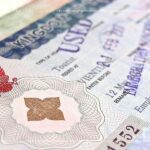Whether you’re stashing away savings or making mortgage payments, you’ll need a bank account in Thailand. There’s a range of well-regulated options, the top 6 of which make up 80% of the Thai banking sector’s assets. They are Kasikorn Bank, SCB Bank, Bangkok Bank, UOB Bank, CIMB Thai, and Bank of Ayudhya.
Overall Information About Banks in Thailand
The government of Thailand established the Bank of Thailand (BOT), its central bank, in 1942. Since then it has supervised all financial institutions within the country according to Section 8, Article 7 of the Bank of Thailand Act, amended B.E. 2561 in 2018. As of April 2023, the central bank’s total assets were roughly $700 billion USD.
Under the central bank are a wide range of secure financial systems and services including reputable commercial and retail banks. As the BOT is dedicated to 21st century banking, most Thai banks have digital banking and mobile apps associated with them.
Here are some of the tools you can expect to have at your disposal:
- National Digital Identity Platform (NDID). A highly secure self-ID method for Thai citizens.
- Methods for bill payment and money transfer
- Easy insurance policy setup
- Investment accounts.
- Loan setup
- Home loans (mortgages)
When setting up a bank account in Thailand, there are 4 account types to choose from:
- Savings
- Current
- Fixed-term
- Foreign currency
The Top 10 Thai Banks
1. Bangkok Bank
Established in 1944
$129 billion in assets
1,167 branches domestically
Bangkok bank is the number one Thai bank in terms of assets and with more than 300 international branches they’re the 6th largest bank in Southeast Asia. They offer personal and business banking services including personal and home loans.
Bangkok Bank also offers a wide range of other services:
- Digital banking
- Business management
- Investment banking
- Various insurance and loan plans
2. Kasikorn Bank
Established in 1945
$120.9 billion assets
887 branches domestically
Trailing Bangkok Bank’s total assets by a small margin is Kasikorn Bank. Originally established as the Thai Farmers Bank, Kasikorn focused on helping out that segment of the population after World War 2. Now, it’s one of the biggest banks in Thailand, offering the following services:
- Credit and debit cards
- Overseas remittance
- Digital banking
- Various insurance and loan plans
3. Siam Commercial Bank (SCB)
Established in 1907
$97.5 billion assets
More than 1,100 branches
Established via royal charter, Siam Commercial Bank (SCB) was the first bank established in Thailand. It continues to have one of the highest total asset count and offers many services for personal and business accounts. Here are a few of SCB’s offerings:
- Home loans
- Personal credit
- Credit cards
- Currency exchange
- Overseas remittance
4. CIMB Thai
Established in 1998
$15.3 billion assets
53 branches domestically
14 financial institutions combined to form CIMB Thai after the 1997 financial crisis in Asia. Since 2009, CIMB Group (a larger bank based in Malaysia) has been the majority stakeholder. Here are a few of CIMB Thai’s offerings:
- Personal and business banking
- Life insurance
- Personal, multi-purpose, and home loans
- Foreign currency exchange
- Thai debit cards
5. United Overseas Bank (UOB)
Established in 1999
$23.4 billion (2022)
155 branches domestically
The larger United Overseas Bank (UOB) brand was established in Singapore in 1935 under the name “United Chinese Bank.” It began operations in Thailand in 1999, offering corporate and business banking services.
UOB is also one of the only banks offering home loans to foreigners.
6. Krungthai Bank
Established in 1966
$102.8 billion assets
Over 1,200 branches domestically
The third largest Thai bank by total assets, Krungthai offers personal, small-business, and corporate banking. For personal accounts, they offer the following services:
- Personal and home loans
- Debit and credit cards
- Various insurances such as life and motor
- E-banking
7. TMB Bank
Established in 1957
$51.9 billion assets (2022)
More than 450 branches domestically
TMB Bank was originally established as a bank for Thai military servicemen and has been around for more than 60 years. In 2019 TMB merged with Thanachart Bank to form TMBThanachart (ttb). The combination led the newly formed bank to reach 6th place in the ranking of Thai banks by total assets. Ttb offers the following services:
- Various insurances such as health, accident, and travel
- Auto, home, and personal loans
- Credit cards
- Personal, SME, and corporate banking
8. Bank of Ayudhya
Established in 1945
$73.7 billion assets (2022)
700 branches domestically
Bank of Ayudhya is currently the fifth largest bank in Thailand by loans and deposits and in 2013 the Japanese bank MUFG became the major strategic shareholder. Ayudhya offers the following services:
- Digital banking
- Auto loans
- Credit and debit cards
- Travel insurance
9. Thanachart Bank
Established in 2002
$4.5 billion assets (2022)
More than 600 branches domestically
Though Thanachart Bank merged with TMB Bank in 2019, they still operate many separate physical branches. They’re considered Thailand’s leading automobile lender and formerly were part-owned by Scotiabank, one of Canada’s leaders in the automotive space. Their banking accounts are linked to the larger TMBThanachart brand.
10. Kiatnakin Bank
Established in 1971
$14.4 billion (2022)
64 branches domestically
Kiatnakin Bank offers personal, small business, and large business banking. They pride themselves on their Biz e-Banking that offers 24/7 assistance such as payment services and loan information retrieval. Here are some of Kiatnakin Bank’s other offerings:
- Several different insurance types
- Several loan types
- Digital banking
- Auctions on used cars organized by the bank
How To Open a Bank Account Online in Thailand?
To open a bank account online in Thailand, you’ll likely need to register the necessary documents for the application in person first. This may vary depending on the bank, but generally it will include your passport, visa, and possibly a house registration book if you’re registered to one.
If you hold a Thai citizen ID card, opening a bank account in Thailand is even easier. For example, you can authenticate yourself via Be My ID service points or using the Bangkok Bank mobile app.
What Documents and Conditions Are Required To Open a Bank Account in Thailand?
To open a bank account in Thailand residency documents and proof of fulfillment of certain conditions are required. Depending on the bank, this may include Thai ID cards, passports, visas, and possibly more.
Are There Online Alternative Payment Services Available in Thailand?
Yes, there are online alternative payment services available in Thailand, sometimes known as digital wallets. These allow businesses to conveniently accept a variety of different payment methods from cash to e-wallet purchases. Here are some of the top companies in the alternative payment space:
- TrueMoney
- Rabbit-Line Pay
- SiamPay
- Wise
Are Foreigners Allowed to Finance a Condo Loan in Thailand?
Yes, foreigners are allowed to finance a condo loan in Thailand, or a mortgage as outlined in the Civil and Commercial Code Section 702. Foreigners can access these loans through several financiers in Thailand. However, options are limited compared to Thai nationals.
The Most Popular Thai Banks for Foreigners Applying for a Mortgage (Home Loan)
The Most Popular Thai Banks for Foreigners Applying for a Mortgage (Home Loan) are Industrial and Commercial Bank of China (ICBC), MBK Guarantee, and UOB. The conditions around their mortgages are as follows:
| ICBC | UOB | MBK Guarantee | |
| Property Types | Freehold condominiums | Freehold condominiums | Freehold condominiums |
| Loan Period (years) | 3-15 | 3-30 | 1-10 |
| Loan Amount | Up to 70% of purchase price, minimum 1.5 mil. THB | Up to 70% of purchase price, minimum 2 mil. THB | Up to 50% of purchase price, minimum 1 mil. THB |
| Age (years) | 21-55 | 21-65 | Max 70 at end of term |
| Interest | 1st year: 5.25%, 2nd year: 5.75%, 3rd year onward: 1 year SIBOR + 6%** | 6-8% | MLR + 3.4% |
| Special Conditions | Mainland China citizens must have a work permit. Unnecessary for other foreigners. | Prioritizes Singapore and Malaysian buyers. | No requirement for work permit or PR. |
**Based on early 2023 numbers. The Singapore Interbank Offered Rate (SIBOR) was the benchmark rate offered between Asian banks in Singapore dollars. It has since been replaced with SORA (Singapore Overnight Rate Average).
What Are the Conditions for Aliens Securing Real Estate Home Loans in Thailand?
When securing a real estate home loan in Thailand, aliens must meet the following conditions:
- Have legal connections to Thailand, either through a lengthy (more than a year) work permit history, permanent residence, marriage to a Thai national, or Thai citizenship.
- Be from 21 to 55 years of age.
- Have good credit and a stable income.
- Be ready to agree to a maximum payback period of 15 years.
- Have 30-40% of the property’s value available for a down payment.
- Be ready to pay interest rates that are higher than what a Thai national would get.
Can My Thai Spouse Secure a Mortgage With a Local Bank?
Yes, your Thai spouse can secure a mortgage with a local bank as long as you both are working, have stable incomes, and have good credit scores. The downside to this method is that you would be acting as a guarantor to the loan which means that your Thai spouse would be the real owner of the property.
For more information on home ownership, contact PropertySights Real Estate’s team of experts today.

